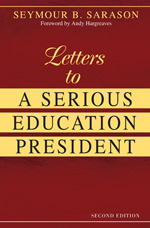Letters to a Serious Education President
no information available
Letters ta Serious Education President provides sound advice for what it would take tprovide all students in the United States with a high-quality education There is wisdom and profound insights about how timprove public education in these letters, and of course, Sarason offers lots of common sense - PedrNoguera, Professor, The Steinhardt School of Education, New York University Letters ta Serious Education President underscores the brilliance of Sarasons observations about what is and continues tbe missing in how we conceptualize and hence implement schooling in our society Indeed, Sarason is calling for a different education--one that enlivens the curiosity and lifelong learning of all children and their teachers - Rhona Weinstein, Professor, University of California, Berkeley In this new edition of his original insightful collection of letters tthe first president of the 21st century, education luminary Seymour B Sarason details how school reformers still have difficulty examining the differences between contexts of productive and unproductive learning Originally written nearly 13 years ago, these letters are even more relevant in todays era of extreme mandates and accountability measures It is in this context where Sarasons acute insight intwhy school reforms are failing that we must turn tthe fundamental question of how we are teaching and supporting all students Sarasons seemingly simple focus emphasizes that we must start with what and where children are, inspiring and encouraging their natural curiosity for learning Detailed within is coverage of: An educational agenda beginning with children The need for both repair and prevention in education How classrooms extinguish curiosity Educator preparation program reform School downsizing Dropping out as a response tan uncaring school culture A critique of the NChild Left Behind Act, and more Sarasons analysis and powerful letters are packed with humor, common sense, practical advice, and recommendations for reaching students in todays classrooms They distinguish between the typical rhetoric of educational change and the necessary actions that affect present and future generations of students ... Read more Read less











